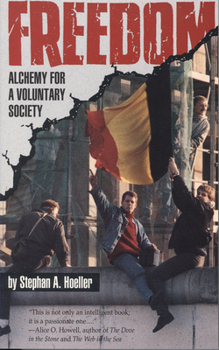Freedom: Alchemy for a Voluntary Society
Dr. Stephan Hoeller examines the philosophic basis for freedom as expressed in the writings of the Gnostics and Carl Jung. He relates this philosophy to that of America's founders and to such recent events as the collapse of Communist regimes throughout the world.
Format:Paperback
Language:English
ISBN:0835606783
ISBN13:9780835606783
Release Date:June 1992
Publisher:Quest Books (IL)
Length:263 Pages
Weight:0.75 lbs.
Dimensions:0.7" x 5.3" x 8.3"
Customer Reviews
1 rating
Jungeo-Gnostic defence of freedom
Published by Thriftbooks.com User , 19 years ago
Hoeller makes the case for liberty based on our Hermetic, Gnostic and Jungian heritage. He notes that liberals are only concerned with freedom where it fits in with their favorite fads, the flavors of the moment being multiculturalism, feminism and environmentalism wrapped in the stifling speech codes of political correctness. He criticizes conservatives by claiming that they defend individual rights only when these do not conflict with the dogmas of the right reflected in slogans like 'family values.' Singling out one faction in the large conservative tent is a bit unfair as is ignoring the magnificent libertarian reforms of Thatcher and Reagan who had a relaxed attitude to religion and whose association with the religious right was exaggerated by the media. The introductory chapter, Individual Soul Against Mass Mind, encompasses discussions of politics as vehicle of consciousness, antinomianism (opposition to rigid religious legalism), Jung's Gnosis of hope and the conflict of the individual with the mass. Hoeller's observations on mass-mindedness and the mass psyche correspond with and complement those of Eric Hoffer in The True Believer whilst his analysis of the breakdown of the stable but flawed (collectivist, hierarchical & static) Christian ecclesiastical worldview (400 AD - 1600 AD) echoes the thoughts of Chantal Delsol in Icarus Fallen where she argues that the European soul was first wounded by the loss of Christianity and then more grievously by the tragic attempts to replace it with secular salvationist creeds in the 20th century. Other attempted substitutes included science, the arts and reason itself. Delsol elegantly likens the failure of these to collapsed cathedrals. Hoeller chronologically lists the factors that dissolved the aforementioned culture as Astronomy, Machiavelli, the Reformation, Physics, the Enlightenment, the Industrial Revolution, Charles Darwin's Evolutionary Theory and Freudian Psychology. The fruits of Freud included the evaluation of human beings in abstract terms like adjustment, socialization, infantilism and narcissism, words that promoted the loss of individual dignity, self-esteem, optimism and creativity. The relentless assault of collectivism continues under many masks; divide & rule has acquired a new meaning as the formation of antagonistic minorities is encouraged. Politicizing ethnicity and accentuating group identity through multiculturalism, condoning barbarism & terror through moral relativism and exalting nature over human life are some prominent manifestations. The history, motives and tactics are exposed with admirable clarity by Stephen Hicks in Explaining Postmodernism. Hoeller considers insidious mass-mindedness as the most lethal danger facing our culture and society. As antidote he advocates the freedom and individualism inhering in the West's psycho-spiritual Gnostic tradition as articulated by Jung. A vital relationship exists between non-mainstream spirituality and the issue




